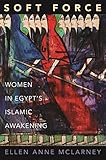Soft Force : Women in Egypt's Islamic Awakening / Ellen Anne McLarney.
Material type: TextSeries: Princeton Studies in Muslim Politics ; 58Publisher: Princeton, NJ : Princeton University Press, [2015]Copyright date: ©2015Edition: Course BookDescription: 1 online resource (336 p.) : 8 halftonesContent type:
TextSeries: Princeton Studies in Muslim Politics ; 58Publisher: Princeton, NJ : Princeton University Press, [2015]Copyright date: ©2015Edition: Course BookDescription: 1 online resource (336 p.) : 8 halftonesContent type: - 9780691158488
- 9781400866441
- Feminism -- Egypt
- Muslim women -- Political activity -- Egypt
- Women in Islam -- Egypt
- SOCIAL SCIENCE / Women's Studies
- Arab Spring
- Arab women
- Bint al-Shatiʾ
- Egypt
- Fann wa-Fiṭra
- Heba Raouf Ezzat
- Iman Muhammad Mustafa
- Islam
- Islamic discourse
- Islamic family
- Islamic literature
- Islamic poetics
- Islamist politics
- Islamists
- Kariman Hamza
- Muslim women
- Niʿmat Sidqi
- Qasim Amin
- Qurʾan
- Safinaz Kazim
- Shams al-Barudi
- adab
- emancipation
- family
- human capital
- political participation
- political work
- psychic transformations
- religiosity
- social vision
- soft force
- traditional roles
- veiling
- women activists
- women's equality
- women's liberation
- women's rights
- women's work
- 305.420962 23
- HQ1793
- online - DeGruyter
- Issued also in print.
| Item type | Current library | Call number | URL | Status | Notes | Barcode | |
|---|---|---|---|---|---|---|---|
 eBook
eBook
|
Biblioteca "Angelicum" Pont. Univ. S.Tommaso d'Aquino Nuvola online | online - DeGruyter (Browse shelf(Opens below)) | Online access | Not for loan (Accesso limitato) | Accesso per gli utenti autorizzati / Access for authorized users | (dgr)9781400866441 |
Frontmatter -- Contents -- Acknowledgments -- Introduction-The Islamic Public Sphere and the Subject of Gender: The Politics of the Personal -- Part One: Women's Liberation in Islam -- 1. The Liberation of Islamic Letters: Bint al-Shati ʾ's Literary License -- 2. The Redemption of Women's Liberation: Reviving Qasim Amin -- Part Two: Gendering Islamic Subjectivities -- 3. Senses of Self: Niʿmat Sidqi's Theology of Motherhood -- 4. Covering in the Public Eye: Visualizing the Inner I -- Part Three: Politics of the Islamic Family -- 5. The Islamic Homeland: Iman Mustafa on Women's Work -- 6. Soft Force: Heba Raouf Ezzat's Politics of the Islamic Family -- Epilogue-Fann wa-Fiṭra: Art and Instinct -- Bibliography -- Index -- Backmatter
restricted access online access with authorization star
http://purl.org/coar/access_right/c_16ec
In the decades leading up to the Arab Spring in 2011, when Hosni Mubarak's authoritarian regime was swept from power in Egypt, Muslim women took a leading role in developing a robust Islamist presence in the country's public sphere. Soft Force examines the writings and activism of these women-including scholars, preachers, journalists, critics, actors, and public intellectuals-who envisioned an Islamic awakening in which women's rights and the family, equality, and emancipation were at the center.Challenging Western conceptions of Muslim women as being oppressed by Islam, Ellen McLarney shows how women used "soft force"-a women's jihad characterized by nonviolent protest-to oppose secular dictatorship and articulate a public sphere that was both Islamic and democratic. McLarney draws on memoirs, political essays, sermons, newspaper articles, and other writings to explore how these women imagined the home and the family as sites of the free practice of religion in a climate where Islamists were under siege by the secular state. While they seem to reinforce women's traditional roles in a male-dominated society, these Islamist writers also reoriented Islamist politics in domains coded as feminine, putting women at the very forefront in imagining an Islamic polity.Bold and insightful, Soft Force transforms our understanding of women's rights, women's liberation, and women's equality in Egypt's Islamic revival.
Issued also in print.
Mode of access: Internet via World Wide Web.
In English.
Description based on online resource; title from PDF title page (publisher's Web site, viewed 30. Aug 2021)


